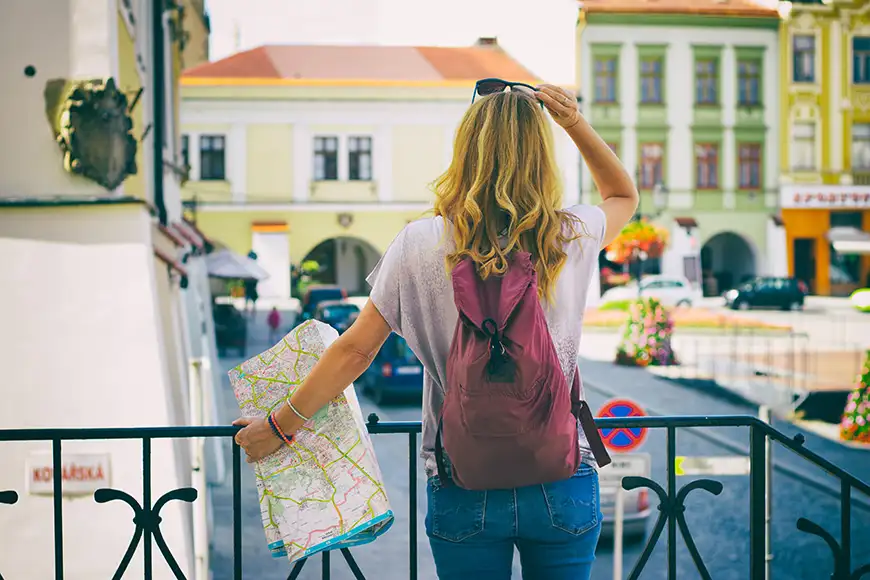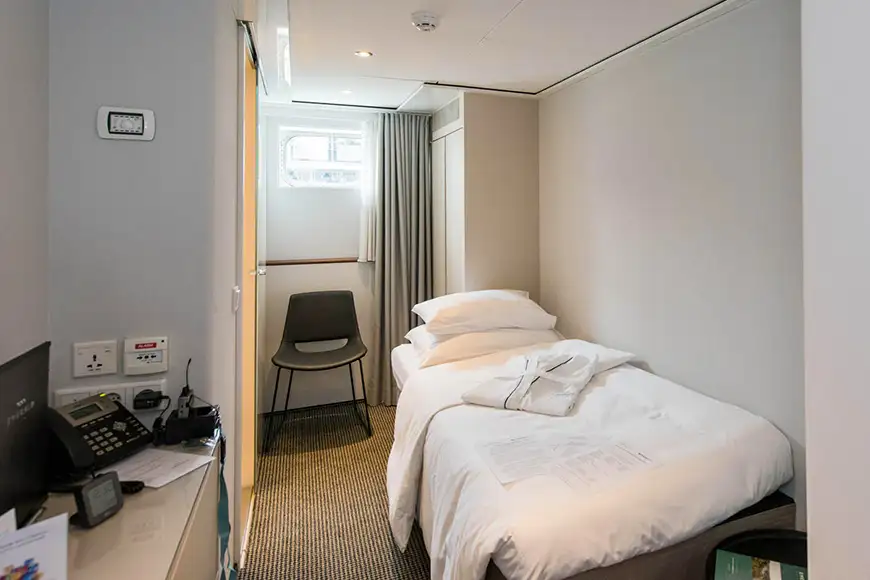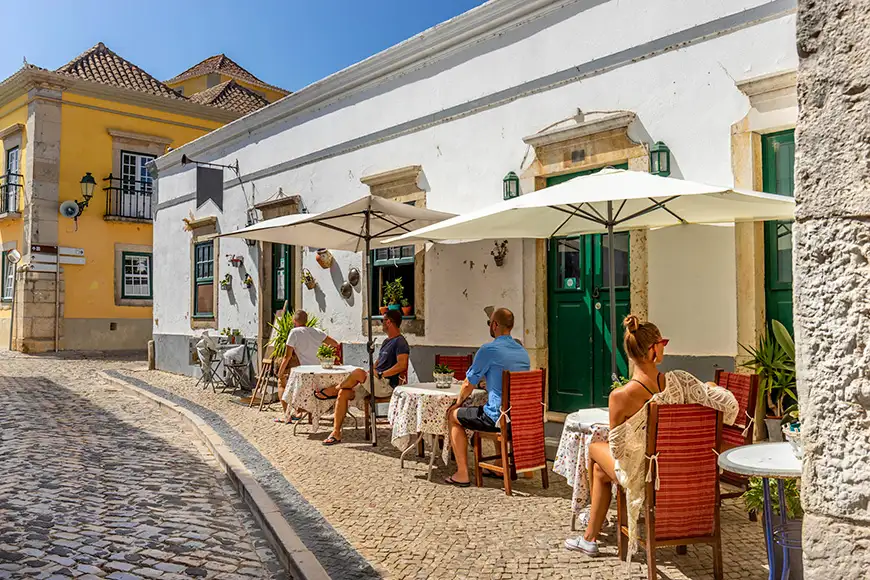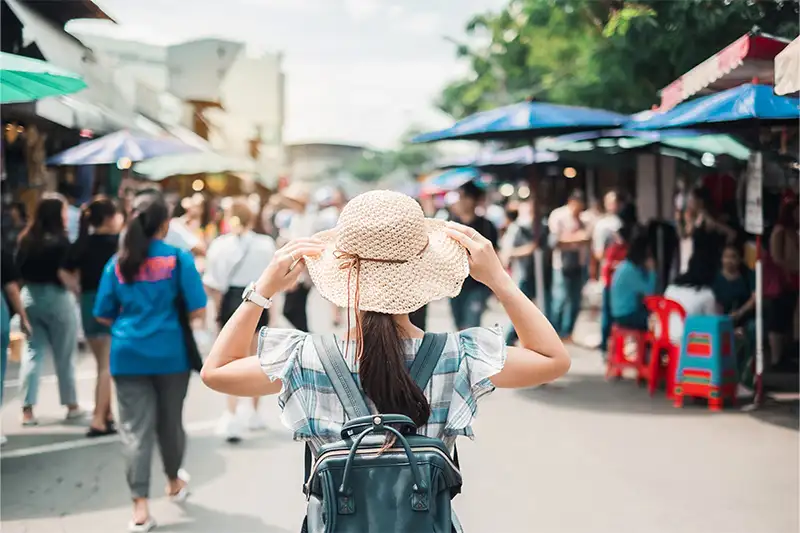People who have never traveled alone often describe their first solo trip as an almost religious experience. To take in new surroundings unfiltered by the prejudices, tastes, or preferences of a traveling companion can be heady stuff. Solo travel gives you the chance to indulge yourself fully.
Of course, traveling alone has its perils too—such as safety concerns, loneliness, and the dreaded single supplement. But a little preparation and common sense can save you money and get you through the rough spots.
- Why Travel Alone?
- How to Travel Alone Safely
- How to Travel Alone as a Woman
- Avoiding the Single Supplement
- Tips for Solo Dining
- When You’ve Had Enough of Solo Travel
- The Best Solo Travel Websites
Why Travel Alone?
Solo travel can be the ultimate in self-indulgence; you can rest when you want and pour it on when you’re feeling ambitious. Another benefit is that your mistakes are your own, and your triumphs all the more exciting. There’s no worrying that your insistence on trekking all the way across town to a museum that was closed ruined your partner’s day; it’s your own day to salvage or chalk up to a learning experience.
Also, you can do exactly what you want to do—all the time. Always wanted to try surfing? Sign up for a class and go for it; there’s no one sitting on the beach feeling bored while you have the time of your life. Have no desire to see Niagara Falls? Just drive right by. For more benefits of solo travel, see 11 Reasons Why You Should Travel Alone at Least Once.
How to Travel Alone Safely

It’s perhaps the foremost question of the solo or single traveler: “Is solo travel safe?” Without a companion to watch your back, you are more vulnerable to criminals and scam artists, as well as simple health worries. But the saying “safety in numbers” isn’t always true—a solo traveler can blend in more easily than a group, and not drawing attention to yourself as a tourist is one way to stay secure.
Here are a few safety tips for traveling alone:
Do your homework before you arrive. Know how long it takes and how much it costs to get from the airport to your hotel or to the city center. Solo travelers are more likely to be “taken for a ride,” so ask the taxi driver for an estimated fare before you leave. If it’s considerably different from what you know to be true, take a different cab (or opt for a rideshare instead).
Choose the right accommodations. Book a hotel with a 24-hour front desk if you’ll be arriving late, so you don’t end up sleeping in your car or worse.
Trust yourself. If it doesn’t feel right, don’t do it.
Carry good identification—in more than one place. If you choose to wear a money belt, use it for storage and not as a purse. Constantly reaching under your shirt for money draws attention to it and defeats the purpose. Instead, keep your passport, extra stores of money, and other important documents tucked away, and use a theft-resistant bag or purse for carrying daily spending money.
Stick to open and public places, especially at night.
Exude confidence. Whether you’re on a street at home or 7,000 miles away, walking confidently and with direction is an effective technique for deterring unwanted attention, since appearing lost or confused can make you vulnerable. If you are lost, walk into a shop or restaurant and ask for directions there.
Avoid appearing like a tourist. Ditch the Disney T-shirt and don’t walk around with your face in a guidebook. (See 10 Things Not to Wear Abroad for more thoughts on this one.)
Leave valuables at home. Don’t draw attention to yourself by wearing flashy clothes or jewelry.
Lie a little. When asking for directions, don’t let on that you are alone: “Can you direct me to the museum? I have to meet a friend.”
Check your maps and transportation schedules before leaving your hotel/train/rental car/tourist office. A solo traveler who’s too absorbed in their phone can be a mark for unsavory types.
Leave a copy of your itinerary with a friend or family member at home, and stay in touch regularly via phone, text, video chat, or email.
Register with the State Department. For U.S. citizens traveling internationally, consider signing up for the free Smart Traveler Enrollment Program (STEP), which could help the State Department assist you in case of emergency. If you’re from outside the States, see if your home country has a similar program.
Arrive during the day. Areas around bus and train stations can be scary and/or deserted, and small towns tend to shut down early. Veteran solo traveler Mara Rothman of San Francisco notes that plenty of beautiful towns can appear eerie at night, and locals who are genuinely trying to help you can appear unnecessarily threatening. Arriving during the day means you’ll be able to find a place to stay and get your bearings before dark.
Trust everyone and no one. One of the best reasons to travel alone is to meet new people, but this also makes you more vulnerable. It’s okay to hang out, travel, and share with new friends, but you might not want to ask them to hold your money. Scam artists can often be the most charming companions you’ll find; you want to be open-minded, but keep your guard up enough to ensure your safety.
How to Travel Alone as a Woman

Though some tips apply to just about every solo traveler, women traveling alone have their own set of safety concerns that most men don’t have to face. Here are a few tips to help you protect yourself.
Exercise hotel safety. At check-in, consider asking for a room near the elevator so you won’t need to walk down long, potentially ill-lit hallways to reach your room. When filling out guest registration forms, consider using your first initial instead of your name, and skip the “Mrs./Miss/Mr.” check box. Additionally, make sure the clerk writes down your room number instead of saying it out loud. This will prevent anyone in the vicinity from knowing where to find you later. Consider packing a door stop to wedge under the door in case the lock is unreliable.
Dress to blend in. To avoid attracting unwanted attention, dress as conservatively as the women you see around you. This doesn’t necessarily mean donning the traditional dress, but a good rule of thumb is to dress modestly. Think knee-length or longer skirts. Bare arms, shoulders, and legs are considered risqué in some countries, so do the research before you go and once you’re there. Note which body parts the local women cover and do the same.
Know when to buddy up. Seeking out company can help you have a safer and more enjoyable experience. Smaller hotels and hostels are great places to find like-minded travelers to explore new places with. And even when you can’t find someone to buddy up with, there are often ways to associate yourself with others so you’ll be less likely to be bothered. In some countries, there are women-only sections in trains and women’s waiting rooms at train stations. Sticking close to families on public transportation and in unfamiliar public markets is another technique some women use.
Combat harassment. Having a repertoire of harassment deterrents can be as important to women travelers as a sturdy pair of shoes and a passport. Not engaging with people who are bothering you can make you a less interesting target. If you want to avoid being approached during lulls in activity, such as while waiting for a train, carry a novel or keep your eyes on your phone to make yourself look busy and involved.
If a situation of harassment escalates, making a scene can sometimes be effective. Many societies place a high premium on respecting social norms, so drawing attention to harassment in a loud and clear manner may solve the problem. The sentence for “leave me alone” is a handy one to learn in the language of your destination.
Avoiding the Single Supplement

Frequent solo travelers are all too familiar with the single supplement, which tour operators and cruise lines often tack onto your bill to make up for the fact that they’re not making money off a second occupant. The supplement can range anywhere from 25 to 100 percent of the trip cost, meaning that you could end up paying twice as much as someone traveling with a partner.
There are several ways to get around the single supplement. You can avoid it altogether by booking with a tour operator that doesn’t charge single supplements on most trips, such as Overseas Adventure Travel.
Many other tour operators, including G Adventures, Intrepid Travel, Exodus Travels, REI Adventures, Adventure Women, and Road Scholar, offer roommate matching. By finding you a roommate, the company maximizes its own profit off each room and saves you the single supplement. The catch is, of course, that you’ll have to share a room with a stranger. If you’re concerned, contact the tour operator and see what kind of procedures it uses to match roommates. Some pair people off at random, while others will try to put travelers of similar ages together.
Several cruise lines offer single staterooms on select ships, including Royal Caribbean, Norwegian Cruise Line, Cunard, and P&O Cruises.
You can sometimes save money by booking at the last minute. Tour operators eager to sell out their last few places may be willing to reduce their usual single supplement. Insight Vacations and Road Scholar are two companies that regularly discount or waive single supplements.
It’s not for everyone, but you may also want to consider staying in a hostel, which charges per bed rather than per room. Hostelling International properties tend to be reliably clean and secure, and they’re open to travelers of all ages. You can find more hostels and read reviews at HostelWorld.com.
Tips for Solo Dining

Eating alone isn’t so bad. Many solo travelers (and frequent business travelers) hate dining by themselves, worried that they appear like some worn-out Willy Loman of the road. There’s even a name for it: solomangarephobia. (Occasionally the fear is justified—see Terror at the Table for One.) The following tips can help you overcome what for many travelers is the most unpleasant aspect of going it alone.
Chat with the service people. Waiters and waitresses are some of the best local color you’ll find.
Choose the right eatery. Cafe or outdoor dining is often attractive to single travelers; sitting alone with a book in a cafe isn’t as unusual as a table for one at a fancy restaurant. You can also opt for a counter seat or a seat at the bar. A restaurant booth can also provide some privacy.
Bring reading material. If you start to feel uneasy sitting alone and staring down at your food, you can crack open a book, whip out your phone, or read a magazine.
Eat in. If you don’t want to endure yet another public meal alone, use room service or order carry-out from a restaurant nearby.
Eat well. Just because you’re alone doesn’t mean you shouldn’t take time for sit-down meals, a leisurely cup of coffee, or a decadent dessert.
When You’ve Had Enough of Single Travel
The constant sensory input and vigilance of traveling alone can wear you down. If you feel your attention or your body flagging, don’t be afraid to back off your ambitious itinerary, slow the pace, and kick back for a bit.
When traveling abroad, seek out an expat bar—locals will often know where these are—where you can hang out and speak your native tongue with some fellow expatriates and travelers. When traveling in more familiar locales, a hot shower and a night in front of the tube in a nice hotel room can often give you enough of a reprieve to send you out eagerly the next morning.
The Best Solo Travel Websites

Best Single Travel offers vacations, cruises, and weekend getaways for solo travelers of all ages.
Flash Pack leads small-group trips of single travelers in their 30s and 40s.
GAFFL, which stands for “Get a Friend for Life,” lets you find travel buddies to meet up with in your destination.
Intrepid Travel has dedicated solo trips as well as a roommate-matching program on the rest of its offerings, so you never have to pay a solo supplement if you don’t want to.
One Traveller is a U.K.-based company leading trips for the “mature single traveller” (aged 50+) to destinations in Europe, Asia, Africa, and the Americas.
Singles Travel International offers trips for solo travelers with an average age 50+. If the company can’t find you a roommate by the time you make your final payment, you can have a room to yourself for free.
Solos is a U.K.-based company offering a wide variety of solo-only trips around the globe.
Solo Traveler offers tips, resources, and destination guides for solo travelers.
Women on the Road offers tips and advice for women traveling alone.
Women Traveling Together is for women travelers, most of them age 50+ and unaccompanied, who prefer to be with a group of like-minded women. The company offers tours, retreats, and other getaways, complete with roommate matching.
Editor’s note: This story was originally published in 2017. It has been updated to reflect the most current information. Sarah Schlichter and Christine Sarkis contributed to this story. All of the products featured in this story were hand-selected by our travel editors. Some of the links featured in this story are affiliate links, and SmarterTravel may collect a commission (at no cost to you) if you shop through them. As an Amazon Associate, we earn from qualifying purchases.
You Might Also Like:
• The Best All-Inclusive Vacations Under $500, Including Airfare• The One Lie You Should Always Tell While Traveling
• 7 Things Not to Do at Hotel Checkout
• Why Didn’t I Get TSA PreCheck on My Boarding Pass if I’m a PreCheck Member?
• 7 Mistakes to Avoid When Booking a Flight
We hand-pick everything we recommend and select items through testing and reviews. Some products are sent to us free of charge with no incentive to offer a favorable review. We offer our unbiased opinions and do not accept compensation to review products. All items are in stock and prices are accurate at the time of publication. If you buy something through our links, we may earn a commission.
Related
Top Fares From
Today's Top Travel Deals
Brought to you by ShermansTravel
Italy: 8-Night Rome, Florence & Venice...
Infinity Worldwide Vacations
 vacation
$2335+
vacation
$2335+
Athens to Venice: 9-Night Cruise w/Choice...
Windstar Cruises
 cruise
$3999+
cruise
$3999+
Ohio: Daily Car Rentals from Cincinnati
85OFF.com
 Car Rental
$19+
Car Rental
$19+




